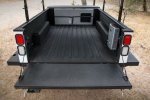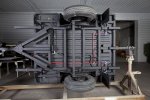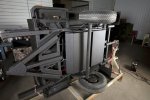Roaddude
Long time off-grid vanlife adventurist
Morning, folks.
I've decided not to build up my M-416 or Bantam T3-C trailers for camping or daily use, for a variety of reasons I'll put in another thread, perhaps. They're both up for sale if anyone is interested.
I'm a short breath away from ordering an XVenture XV-2 trailer. Definitely getting one, and am all set for most options and extras but wonder if anyone here has personal experience with their 2300# or 3500# rated axles, or similarly rated axles on your own trailers of any type. I know their 4200# would be too heavy/stiff/bouncy-when-empty for my general purposes, but I'm undecided between the 2300 and 3500. They're shipping stock these days with 2300# axles. I'm leaning towards the 3500# axle.
Tim K, at Schutt Industries, has been extremely helpful and very patient with my many questions. I'd like to see what additional wisdom I can glean from people here who have more experience than I have with axle ratings for different trailer uses.
Primary Use: Extended cross-country travel, both on-road and off throughout lower 48, Canada, and up to Alaska for photography, writing, and workshops of various types. With an extended body GMC cargo van (155" wb) as primary tow vehicle, I have no delusions about doing any super technical trails or serious rock-climbing. Also will be offering base-camp support for small group outings; sort of chuck-wagon/first-aid/photog/drone operator guy. The trailer may be towed by other vehicles at times.
I will be hauling more fuel, water, and gear in my trailer than most might, so I can stay off-road and back-country for longer periods, if I choose. Up to 280 lbs of fuel and water. Spare rim and tire on swing-away arm, RTT and annex of anywhere from 150 - 225 lbs, recovery gear, hi-lift jack and kit, lots of photog gear, 270 awning and side panels, camp furniture/camp kitchen/work tables (mostly aluminum gear), two deep cycle batteries (to start, potentially more for off-grid living), multiple solar panels, Honda eu2000i gen (46lbs), eBike (55lb), propane tank, and a bunch of gear I'm testing and reviewing.
She'll be packed chock-full most of the time I'm on the road, with RTT overhead and stuff strapped under the elevated rack. Sometimes a kayak or canoe. I don't even know how to gauge the weight of all of it together before actually getting the trailer, packing it, and going to a scale. My loads will change drastically from one trip to the next, depending on destination, purpose, and length of journey.
Secondary: Main support for small off-grid housing (month or more at a time) and remote building sites, as it provides solar capability, 12v and 110 power, hot water/shower, built-in LED lighting system, and ability to haul just about anything I need.
Tertiary: Urban household/garden/light carpentry (soil, stone and other landscape and building materials) and helping friends/neighbors move belongings. Occasional farm use, too. The rack comes off and the XV-2 bed is pretty much pick-up sized at 59"W (49" between wheel wells), 89"L, 19"H. I know all too well I'll be hauling everything from appliances to pallets full of building materials to hay and bedding for horses.

I also plan to build an aluminum-skinned hardshell slide-in camper unit at some point to extend its versatility even more.
A lot of highway miles, a lot of dirt road miles, and a good bit of neighborhood miles. Used regularly and hard, rarely empty, though potentially under-loaded at times while under way. That's the plan, though I know from experience plans often go awry. Things could change up dramatically, but at the heart of it will be an extremely functional trailer that will support a wide variety of use and terrain.
The XV-2 base package has a dry weight of 1200lbs and for suspension has a rubber torsion axle.

:Axle and plumbing config:

:underside shield protecting 22gal water tank:
I know a lot of guys building their own trailers go for Dexter or Timbren set-ups rated for 3500#, though under steel frames and often steel boxes. Have you been happy with the 3500, or wish you had lighter or more?
The XV-2 box is all aluminum on a legendary military spec, all aluminum, Alcoa huck-bolted frame. They've made some 50,000 frames for governments and military around the world. Though light in weight, this trailer is a rugged beast, truly severe-duty, so I'm not awfully worried about it shaking apart in my lifetime, or even in my kid's lifetime. Along with much of my other gear, I expect it to be around long after I'm gone, getting used hard.
What do y'all think, based on your experience and my uses as described above...2300# or 3500#? I think I may have answered my own question in putting it all down above, but am very interested in other opinions.
Much appreciated.
Dry roads and open skies to everyone,
Road
I've decided not to build up my M-416 or Bantam T3-C trailers for camping or daily use, for a variety of reasons I'll put in another thread, perhaps. They're both up for sale if anyone is interested.
I'm a short breath away from ordering an XVenture XV-2 trailer. Definitely getting one, and am all set for most options and extras but wonder if anyone here has personal experience with their 2300# or 3500# rated axles, or similarly rated axles on your own trailers of any type. I know their 4200# would be too heavy/stiff/bouncy-when-empty for my general purposes, but I'm undecided between the 2300 and 3500. They're shipping stock these days with 2300# axles. I'm leaning towards the 3500# axle.
Tim K, at Schutt Industries, has been extremely helpful and very patient with my many questions. I'd like to see what additional wisdom I can glean from people here who have more experience than I have with axle ratings for different trailer uses.
Primary Use: Extended cross-country travel, both on-road and off throughout lower 48, Canada, and up to Alaska for photography, writing, and workshops of various types. With an extended body GMC cargo van (155" wb) as primary tow vehicle, I have no delusions about doing any super technical trails or serious rock-climbing. Also will be offering base-camp support for small group outings; sort of chuck-wagon/first-aid/photog/drone operator guy. The trailer may be towed by other vehicles at times.
I will be hauling more fuel, water, and gear in my trailer than most might, so I can stay off-road and back-country for longer periods, if I choose. Up to 280 lbs of fuel and water. Spare rim and tire on swing-away arm, RTT and annex of anywhere from 150 - 225 lbs, recovery gear, hi-lift jack and kit, lots of photog gear, 270 awning and side panels, camp furniture/camp kitchen/work tables (mostly aluminum gear), two deep cycle batteries (to start, potentially more for off-grid living), multiple solar panels, Honda eu2000i gen (46lbs), eBike (55lb), propane tank, and a bunch of gear I'm testing and reviewing.
She'll be packed chock-full most of the time I'm on the road, with RTT overhead and stuff strapped under the elevated rack. Sometimes a kayak or canoe. I don't even know how to gauge the weight of all of it together before actually getting the trailer, packing it, and going to a scale. My loads will change drastically from one trip to the next, depending on destination, purpose, and length of journey.
Secondary: Main support for small off-grid housing (month or more at a time) and remote building sites, as it provides solar capability, 12v and 110 power, hot water/shower, built-in LED lighting system, and ability to haul just about anything I need.
Tertiary: Urban household/garden/light carpentry (soil, stone and other landscape and building materials) and helping friends/neighbors move belongings. Occasional farm use, too. The rack comes off and the XV-2 bed is pretty much pick-up sized at 59"W (49" between wheel wells), 89"L, 19"H. I know all too well I'll be hauling everything from appliances to pallets full of building materials to hay and bedding for horses.

I also plan to build an aluminum-skinned hardshell slide-in camper unit at some point to extend its versatility even more.
A lot of highway miles, a lot of dirt road miles, and a good bit of neighborhood miles. Used regularly and hard, rarely empty, though potentially under-loaded at times while under way. That's the plan, though I know from experience plans often go awry. Things could change up dramatically, but at the heart of it will be an extremely functional trailer that will support a wide variety of use and terrain.
The XV-2 base package has a dry weight of 1200lbs and for suspension has a rubber torsion axle.

:Axle and plumbing config:

:underside shield protecting 22gal water tank:
I know a lot of guys building their own trailers go for Dexter or Timbren set-ups rated for 3500#, though under steel frames and often steel boxes. Have you been happy with the 3500, or wish you had lighter or more?
The XV-2 box is all aluminum on a legendary military spec, all aluminum, Alcoa huck-bolted frame. They've made some 50,000 frames for governments and military around the world. Though light in weight, this trailer is a rugged beast, truly severe-duty, so I'm not awfully worried about it shaking apart in my lifetime, or even in my kid's lifetime. Along with much of my other gear, I expect it to be around long after I'm gone, getting used hard.
What do y'all think, based on your experience and my uses as described above...2300# or 3500#? I think I may have answered my own question in putting it all down above, but am very interested in other opinions.
Much appreciated.
Dry roads and open skies to everyone,
Road
Last edited:

